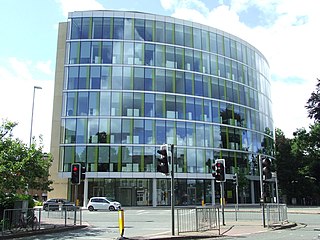
A law firm is a business entity formed by one or more lawyers to engage in the practice of law. The primary service rendered by a law firm is to advise clients about their legal rights and responsibilities, and to represent clients in civil or criminal cases, business transactions, and other matters in which legal advice and other assistance are sought.

DLA Piper is a law firm with offices in over 40 countries throughout the Americas, Asia Pacific, Europe, Africa, and the Middle East. In 2021, it was the third largest law firm in the United States by revenue.

Nixon Peabody LLP is a Global 100 Boston-based law firm with over 700 attorneys collaborating across major practice areas in cities across the U.S. and in international offices in London, Hong Kong, and Shanghai. In addition to the firm's Boston headquarters, it maintains U.S. office locations in New York City, Washington, D.C., Chicago, San Francisco, Los Angeles, Palo Alto, Albany, Buffalo, Manchester, Rochester, and Providence.
Wilmer Cutler Pickering Hale and Dorr LLP, also known as Hale & Dorr and WilmerHale, is an international law firm with offices in the United States, Europe and Asia. It is co-headquartered in Washington, D.C., and Boston. It was formed in 2004 through the merger of the Boston-based firm Hale and Dorr and the Washington-based, firm Wilmer Cutler & Pickering, and employs more than 1,000 attorneys worldwide.

Dechert LLP is a multinational American law firm of more than 900 lawyers with practices in corporate and securities, complex litigation, finance and real estate, financial services, asset management, and private equity. In 2021, the firm raised revenues by 25%, with a total of $1.3 billion. On Law.com's 2022 Global 200 survey, Dechert ranked as the 41st highest grossing law firm in the world.
Honigman LLP is a law firm founded in Detroit with over 350 attorneys in eight offices. The firm ranked 135th on The American Lawyer's 2019 AmLaw 200 rankings of U.S. law firms.
Thomas Vincent Girardi is a former attorney and co-founder of the now-defunct Girardi & Keese, a downtown Los Angeles law firm. He was disbarred in 2022 after accusations of defrauding clients. He is separated from his third wife, the performer Erika Jayne, with whom he occasionally appeared on The Real Housewives of Beverly Hills in their Pasadena mansion.

Saul Ewing LLP is a U.S.-based law firm with 18 offices and approximately 425 attorneys providing a broad range of legal services. Its offices are located along the East Coast from Boston to Miami and extend into the Midwest by way of Chicago. On September 1, 2017 Saul Ewing LLP and Arnstein & Lehr LLP merged to form Saul Ewing Arnstein & Lehr LLP. In November 2022, the firm changed its name back to Saul Ewing LLP as part of a rebrand effort. On August 1, 2023, the firm merged with Los Angeles based Freeman Freeman & Smiley.
Peter Charles Bernard Bynoe is a Chicago attorney and businessman, formerly the only African-American equity partner in the Chicago office of DLA Piper. In 1989, he and his business partner Bertram Lee were the first African-Americans to buy a controlling interest in a National Basketball Association (NBA) team, when they purchased a 37.5% share of the Denver Nuggets basketball team, and he is among the most influential minority figures in sports law and management.
Bingham McCutchen LLP was a global law firm with approximately 850 attorneys in nine US offices and five international offices. It ceased operations in late 2015, when several hundred of its partners and associate lawyers left the firm to join Philadelphia-based Morgan Lewis.
WolfBlock LLP was a large U.S. law firm and lobbying group based in Philadelphia, Pennsylvania. The National Law Journal ranked WolfBlock the 149th-largest firm in the United States, and the 10th-largest in Philadelphia, by number of attorneys. The firm was known for being one of the oldest law firms in Philadelphia.
Keck, Mahin & Cate was a law firm based in Chicago, Illinois that was founded in 1886 and stopped operations in 1997.

Emily Clark Hewitt is an American lawyer and minister who served as a former judge and the chief judge of the United States Court of Federal Claims.
Verrill, LLP is a New England regional law firm. The firm has offices in Portland, Maine; Augusta, Maine; Westport, Connecticut; Boston, Massachusetts; Providence, Rhode Island; White Plains, New York; and Washington D.C. It has more than 120 lawyers in seven regional offices.

Christopher M. Markey is an American lawyer and politician serving as a member of the Massachusetts House of Representatives from the 9th Bristol district. A member of the Democratic Party, he was first elected in 2010.

DeWitt LLP is a U.S. law firm based in Madison, Wisconsin. It is the largest firm in the Greater Madison Area, with an office in Minneapolis, Minnesota, and is among the ten largest firms in the State of Wisconsin.
Arthur Dehon Hill was an American lawyer who served as District Attorney of Suffolk County, Massachusetts, and was a defense counsel for Sacco and Vanzetti.

David Alan Hoffman is an American attorney, mediator, arbitrator, author, and academic. He is the John H. Watson, Jr. Lecturer on Law at Harvard Law School. He is also the founder of Boston Law Collaborative. His TEDx talk on Lawyers as Peacemakers describes his decision to discontinue courtroom advocacy and focus exclusively on mediation, arbitration, and Collaborative law.








